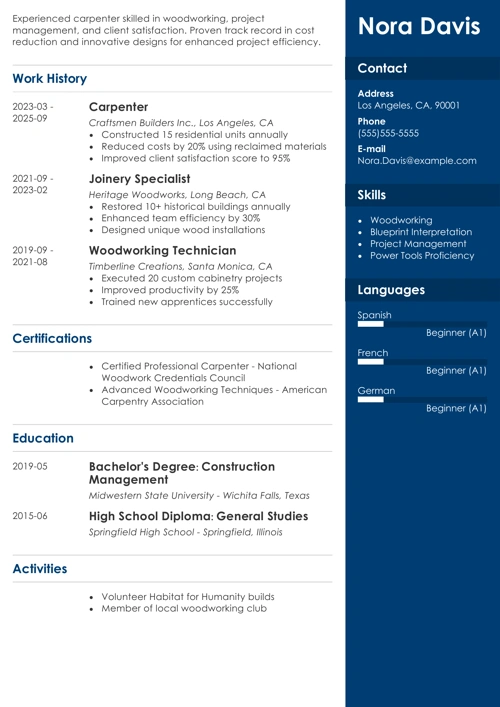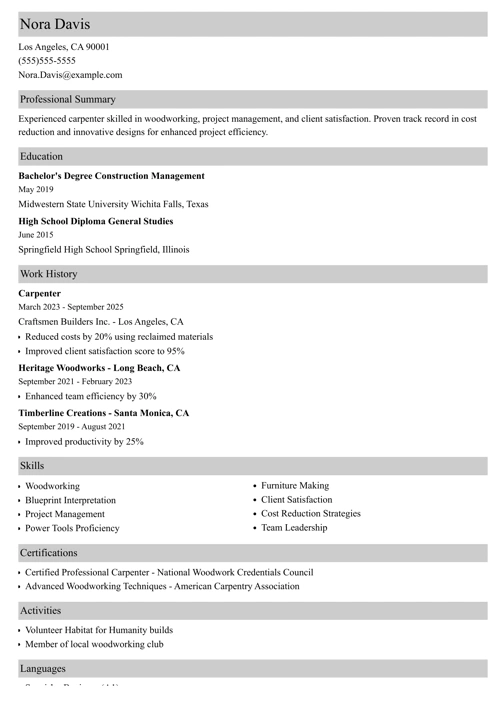When you're getting ready to apply for a job, one big question might pop into your head: How long should my resume be? Should it be one page? Two? More?
A resume is your chance to show off your skills and experience, but you don’t want to overwhelm the person reading it.
In this article, we’ll help you figure out the right length for your resume so you can make a great first impression and get one step closer to landing the job.
Want to save time and have your resume ready in 5 minutes? Try our resume builder. It’s fast and easy to use. Plus, you’ll get ready-made content to add with one click. Explore our free resume templates and start building your resume today.
Sample resume made with our builder—See more resume examples here.
Before you dive deeper, look at the video created by our career expert Caio on how long should a resume be:
Need more information on creating an effective resume? Check the guides below:
- Different Types of Resumes
- Essential Parts of a Resume
- How to Improve Your Resume in 12 Easy Steps
- Two Column Resume
- Best US Resume Format
How Many Pages Should a Resume Be?
The short answer is: one page. Hiring managers spend mere seconds reading your resume. A one-page resume ensures that all critical information is front and center, and nothing important is left behind.
However, there are instances where two or even three pages may work.
So, how long should your resume be? A good rule of thumb when deciding the ideal resume length is to consider your level of experience.
Recent graduates and job seekers with 10 years of experience or less should keep their resumes to one page. Seasoned professionals with over a decade of work history can send in a two-page resume to offer a complete look into their career.
What is the ideal length for a resume?
The shorter, the better.
The key is to tailor your resume to the job and make it a concise overview of your most relevant qualifications. An application for an entry or mid-level position doesn't need to include all your past roles—just the ones that helped you prepare for this role.
But, if you're applying for a manager or executive job, a longer resume can show you have the hands-on experience to lead a team and make difficult business decisions.
Pro tip: If you’re going for a two-page resume, include enough information to fill the entire second page to optimize it for ATS.
When you’re done, Zety’s resume builder will score your resume and our resume checker will tell you exactly how to make it better.
5 Tips for Ideal Resume Length
Whether you're writing a one, two, or even three-page resume, these rules will help you make sure it checks all the boxes.
1. List only relevant information
Remember, a resume is a snapshot of your qualifications. Your goal is to show the employer you have the required skills and experience to perform the role. Focus only on the qualities that make you the right fit for the position.
2. Limit responsibilities to three or five bullet points
When listing your work experience, condense your duties to no more than five bullet points, unless you have two jobs or less to list. This will allow you to hone in on critical information and will keep details brief for the hiring manager.
3. Avoid personal pronouns
Instead of saying "I managed a team of five," lead with a strong action verb and omit the pronoun: "Managed a team of five." This keeps your resume clean, professional, and easier to scan.
4. Replace duties with achievements
Whenever possible, discuss your accomplishments instead of your job duties. Measurable outcomes like "Increased social media engagement by 40% in six months" show your skills and your drive. Achievements will still include your responsibilities, but they will also highlight your impact in the process.
5. Make it easy to read at a glance
Use a simple resume format with clear headings, consistent spacing, and bullet points. Stick to a professional font like Arial or Calibri, and avoid cramming too much text onto the page. A clean, well-organized resume helps hiring managers quickly find the most important details.
Key Takeaways
Now that you know how long your resume should be, let's review some key points:
- When in doubt, opt for a one-page resume that quickly showcases your qualifications.
- If you're a job seeker with over 10 years of experience, you can use a two-page resume to highlight all your skills and expertise.
- Always focus on including the most relevant information to keep your resume concise and targeted.
- Limit past roles entries to three or five bullet points, depending on how many jobs you’ve had.
- Lead with strong action words and omit pronouns like "I" and "my."
- Replace your job duties with work accomplishments whenever possible to underline your impact.
- Use a professional font and consistent formatting to optimize your resume's readability.
About Zety’s Editorial Process
This article has been reviewed by our editorial team to make sure it follows Zety's editorial guidelines. We’re committed to sharing our expertise and giving you trustworthy career advice tailored to your needs. High-quality content is what brings over 40 million readers to our site every year. But we don't stop there. Our team conducts original research to understand the job market better, and we pride ourselves on being quoted by top universities and prime media outlets from around the world.



